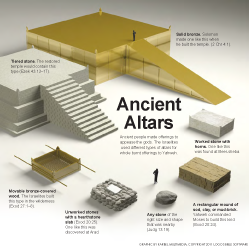43:1–5 Psalm 42 and 43 were probably one psalm originally. See note on 42:title–43:5. |
43:1 Judge me, O God Believing himself unjustly accused, the psalmist cries out to God to clear his name. See 7:8 and note; and 17:2 and note.
case The Hebrew word used here, riv, typically refers to a legal dispute. See note on Job 9:3.
an unfaithful nation The Hebrew phrase used here, lo-chasid, refers to those who are unfaithful to Yahweh. See Ps 18:25 and note; 32:6 and note.
43:2 Why have you rejected me Though he takes refuge in God, the psalmist also despairs the feeling that God has left him. See 42:9 and note.
43:3 your light Represents Yahweh’s guiding presence. See 18:28 and note; Job 29:2–3; compare Ps 27:1.
to your holy mountain and to your dwelling places Refers to the temple in Jerusalem. The psalmist wants God’s light and truth to lead him into God’s presence at the temple, where he can quench his thirst for God (see 42:1 and note). See note on 27:4.
43:4 the altar of The psalmist is referring to the altar in the temple (2 Chr 4:1).
lyre This instrument was used in celebrations and worship.
43:5 Why are you in despair, O my soul The psalmist closes by repeating the refrain from Psa 42 (42:5, 42:11). See note on 42:5.

|
About Faithlife Study BibleFaithlife Study Bible (FSB) is your guide to the ancient world of the Old and New Testaments, with study notes and articles that draw from a wide range of academic research. FSB helps you learn how to think about interpretation methods and issues so that you can gain a deeper understanding of the text. |
| Copyright |
Copyright 2012 Logos Bible Software. |
| Support Info | fsb |
 Loading…
Loading…
